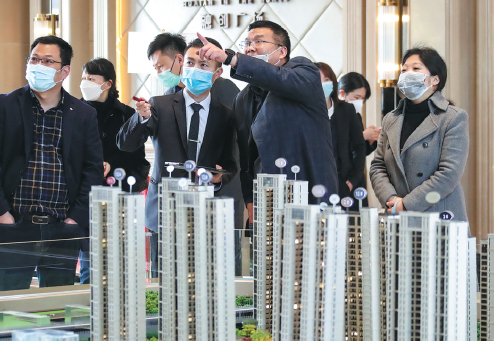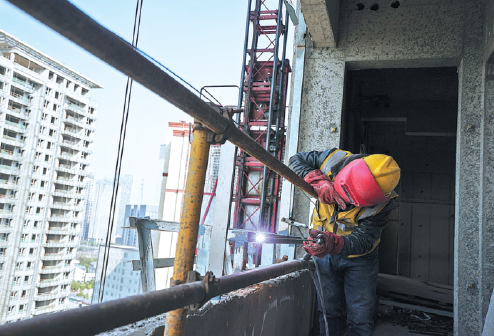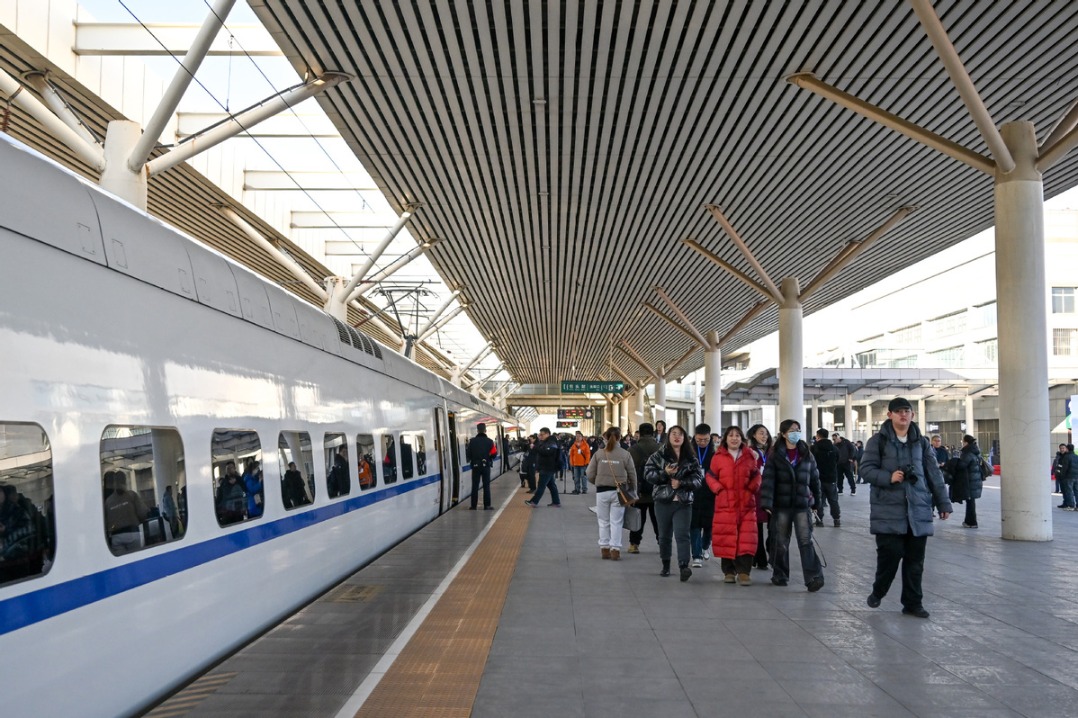Housing market enduring turbulent times
The coronavirus outbreak taking bite out of prices, but recovery likely on horizon

Tang Yao, a 29-year-old middle-school teacher, has been pondering a real estate move for the past year. But high housing prices in Beijing have kept Tang and her husband-to-be out of the property market.
The young couple took a close look at some 50 different apartments over the past several months. Due to their limited budget, they were torn between two choices-a higher-end option for an additional 300,000 yuan ($42,400)-or more affordable digs.
"The coronavirus outbreak seemed to open a window for us as we noticed average home prices drop during the epidemic," said Tang, who quickly purchased the more upscale apartment once the owner lowered the price.
But for her friends who are also on the hunt for accommodations in top-tier cities, Tang said that many of them are still waiting for even sharper drops in property prices in the future.
"Some of them are also afraid to go to see apartments for fear of being infected," she added.
Prices for new homes in 23 out of 70 large and medium-sized Chinese cities saw a month-on-month drop in February, compared with 15 in January, said the National Bureau of Statistics. As for pre-owned homes, a month-on-month decline in prices was seen in 27 cities, while 14 cities saw growth, most of which was negligible. Beijing prices dropped 0.2 percent, Guangzhou fell 0.1 percent, while Shanghai and Shenzhen, Guangdong province, grew 0.2 percent and 0.5 percent, respectively.
With offline sales offices closed and potential buyers secluded at home, the sales area of housing nationwide decreased 39.9 percent year-on-year during the January-February period, while sales value dropped 35.9 percent, the bureau said. Many cities, including Wuhan, Hubei province-the original epicenter of the novel coronavirus outbreak-reported zero transactions in February.
The outbreak has had a significant influence on the real estate sector due to its dampening of outdoor activities, transportation, consumption, face-to-face commerce and services.
Li Naichao, head of the Beijing Residential Real Estate Chamber of Commerce, said most residential complexes have been asking for entrance permits from visitors to control the virus. This prevented agents and clients from freely seeing apartments with their own eyes. In addition, individual incomes were also affected due to the epidemic, which made clients more cautious regarding major spending decisions, Li said.
Slumping transaction prices also shook the confidence of sellers. Newly released homes on Homelink-a major property-trading platform-declined 57.7 percent in the first two months of 2020 compared with 2019.
In addition, investment, new projects and land purchases all decreased significantly.
Real estate investment was about 1.01 trillion yuan in January and February, down 16.3 percent year-on-year. The area of newly constructed residential buildings declined 44.4 percent to reach 75.59 million square meters, and the land purchase area dropped 29.3 percent to 10.92 million sq m, the NBS said.
The business slowdown has posed challenges for real estate companies, weighing on the capital-intensive sector.
Xie Chen, head of research at property services firm CBRE China, said that with the decline of sales and the upcoming peak for debt maturity, property developers have accelerated domestic and overseas financing. Related bonds issued in January and February reached about 250 billion yuan, the highest in history during the period.
"In the autumn of 2018, the theme of our annual meeting was 'Survive', to remind us of risks and to keep calm and cautious. I didn't expect this to become so real today," Yu Liang, chairman of property operator China Vanke, said at a recent news conference.
Sales of the company dropped 35.1 percent in February. With the resumption of operations postponed, delivery of some 10,000 residential units in the first quarter was delayed, the company said.
Sunac China reported an over 30 percent decline in sales in February. Country Garden announced a more than 49 percent drop in sales that month. The sales area of Longfor reached 434,000 sq m in February, down over 35 percent year-on-year, while its sales amount declined 29.9 percent to 7 billion yuan.
Over 100 real estate companies went bankrupt from early 2020, most of which were small and medium-sized companies in second and third-tier cities, according to the People's Court Announcement.
Liu Yu, principal of consultancy Roland Berger China, said the COVID-19 crisis may accelerate market concentration and change the competitive landscape.
"The leading players will increase market share by land reserve bidding and mergers and acquisitions. Healthy financing, asset turnover acceleration and sales payment collection quality should be highly emphasized by the management of developers with tight cash flow," Liu said.
Promotions and online services have sprung up to stimulate the market. Property play Evergrande pushed its ads on multiple media outlets-"the biggest ever discount in history: 25 percent"-in the second half of February. The discount remained at 22 percent in March. Jinke announced in late February it would offer a 10-50 percent discount. Poly provided a coupon for consumers to pay 8.8 yuan to get a 10,000 yuan discount over the last two months.
Thanks to the promotion, sales of Evergrande reached about 44.73 billion yuan in February, up 108 percent year-on-year.
Livestreaming was also widely used. China Real Estate Information Corp said 143 out of the top 200 property operators initiated "cloud purchasing" services-online consulting, transactions and virtual reality-backed inspections. There were over 75,684 livestreaming events for new homes in February with 1.03 billion total views, according to real estate agent Fang.com.
However, the effect of sales promotions were limited. A woman surnamed Yang told the Beijing News that she tunes into livestreaming to know more about apartments and to comparison shop, but the real decision will have to be made after visiting the apartment in person.
Despite the challenges, experts believe the impact of COVID-19 on the property sector will be controllable and only short-term, due to sustained strong demand from Chinese consumers. And a rebound in sales and price stabilization can be foreseen.
"Unlike catering, tourism and entertainment and other real-time consumption, real estate is a continuous and long-term act of consumption. That's why the (contagion's) impact will be milder, and the sales rebound afterward is very likely to offset the impact," said Hou Yunchun, former deputy director of Development Research Center under the State Council, at a recent meeting.
Liu from Roland Berger said: "Residential sales are prolonged instead of being diminished, which is expected to rebound from the late second quarter or third quarter. High-tier cities have strong recovery momentum."
Online transactions grew 40 percent in the first half of March month-on-month, though they're still 20 percent less than in 2019, said real estate agency Centaline Property. Zhang Dawei, chief analyst of the company, told the Beijing News, that with domestic epidemic controls bearing fruit, some buyers have restarted their purchase plans, including those who want to improve their living environment.
"The market is recovering faster in South China, but is far from a warming up," Zhang said, adding that more policies are needed to stimulate demand.
Cao Jingjing, deputy director of the research center of the China Index Academy, said by now more sales offices have opened, often with limitations on passenger flow, and the motivation for purchasing homes has improved over the first two weeks of March.
Cao said the sales area is expected to drop from 5 to 8 percent throughout the year but still remains high at about 1.6 billion sq m.
Despite pressure of an economic downturn, China continued to pledge tight monitoring of possible speculation in the housing market, with the principle that "housing is for living in, not for speculation".
NBS spokesman Mao Shengyong said in mid March that the country has maintained stable land prices, market expectations and housing prices, and short-term policies to support the property market are not among the government's stimulus options.
Xu Biao, chief strategy analyst of TF Securities, told Cailian Press that the regulations on real estate are not likely to loosen from the central government level. But policies based on different conditions in different cities may be more flexible.
Xie from CBRE China said housing prices are expected to stay steady this year. "While the outbreak may dim homebuyers' expectations of personal income, their housing expenses will also decrease due to lower mortgage rates."
Over the long term, demand in first and second-tier cities-with a limited housing inventory-will remain strong, driven by migrant populations and growth in individual income. However, the oversupply of homes in lower-tier cities will be worsened by the epidemic so that some property developers have been resorting to special offers to promote sales, he added.
He said after the epidemic, homebuyers will seek better property management regimes for the communities, including intelligent access, air purification technologies and more advanced sewer systems. They will also prefer low-density communities.
Chen Jing at consultancy PwC China said ongoing urbanization will further promote demand for housing improvements, but the market will transform from volume expansion to structural differentiation. He added that prices would see moderate growth in developed cities and moderate declines in other regions. "Drastic fluctuations are not likely to happen."
Chen doesn't suggest buyers invest in real estate using leverage. "The best timing (for buying a house) is when you have the most demand."
He added that surrounding commercial and medical facilities should also be taken into consideration when choosing a home.
Cheng Yu contributed to this story.


Today's Top News
- Xi urges central SOEs to contribute more to Chinese modernization
- Five continents, five rhythms in 2025
- Lawmakers review draft law to expand childcare services
- China's new-style tea brands find a hot new market in US
- Xi extends congratulations to Chilean president-elect
- Japan urged to stop provocative moves






























